In an era where digital systems drive business operations, customer trust is no longer just a branding issue—it’s directly tied to how secure, compliant, and resilient your organization is. It is no longer enough to deliver a quality product or service. Today’s customers, investors, and regulators expect visible, verifiable commitment to cybersecurity and operational integrity.
The cost of ignoring this shift? A loss of credibility, client attrition, and long-term reputational damage.
The Shift from Optional to Essential
Once upon a time, trust depended on pricing, service delivery, and a familiar brand. Now, it hinges on how responsibly your organization protects customer data, secures digital infrastructure, and navigates cyber threats.
Ransomware attacks, regulatory breaches, and operational outages directly impact public perception. And regulations like DORA, MiCA, NIS2, and ISO 27001 have moved from optional standards to mandatory frameworks.
These regulations do more than enforce penalties—they build trust by holding organizations accountable to measurable security and governance standards.
What Defines a Secure & Trusted Business?
A trusted business integrates cybersecurity into its operational DNA. That means treating security as an evolving discipline, not a checklist. Here’s what that looks like across three pillars:
1. Digital Resilience & Security Architecture
Secure organizations proactively uncover vulnerabilities before they become incidents. They invest in:
- Penetration testing and gap assessments
- Adaptive, layered infrastructure
- Incident response and business continuity planning
This isn’t just best practice—it’s expected under DORA’s Threat-Led Penetration Testing (TLPT) and similar international benchmarks.
2. Regulatory Compliance & Governance
Modern compliance is about strategic alignment. Organizations must document and demonstrate:
- ICT risk management processes
- Data security protocols and vendor controls
- Audit readiness and secure reporting procedures
Frameworks like DORA, MiCA, and ISO 27001 now overlap, creating a regulatory fabric that defines market trust.
3. Organizational Awareness & Operational Maturity
Security is as much cultural as it is technical. Trusted organizations prioritize:
- Cybersecurity training and phishing simulations
- Clear accountability and internal processes
- Metrics-driven resilience programs
Employees are the first line of defense—and visible security culture is often the difference between reaction and prevention.
Why It Matters Now
Cyberattacks, cloud misconfigurations, and third-party risk incidents are rising across sectors. But for many organizations, the real challenge isn’t just prevention—it’s proving they’re prepared.
Clients and partners now expect transparency into your security controls. And regulatory bodies across Europe are synchronizing expectations under DORA, NIS2, and MiCA. Falling behind is no longer a viable business position.
Demonstrating security readiness and compliance is a differentiator. It’s how serious businesses win and retain trust.
How Konkrit Solutions Can Help
At Konkrit Solutions, we take a multidimensional approach to cybersecurity and compliance. Our services are designed to both reduce risk and amplify trust:
- Independent security gap assessments and remediation planning
- Compliance implementation for DORA, NIS2, SOC 2, ISO 27001, and MiCA
- IT advisory and infrastructure reviews
- Digital process optimisation and security automation
- Team training and regulatory awareness programs
We help you move beyond compliance checklists to build trust-based resilience.
Is Your Business Secure—and Seen as Secure?
Trust doesn’t start with marketing or end with a privacy policy. It starts with security that can be seen, measured, and proven.
If your business hasn’t conducted a gap assessment, reviewed its exposure, or aligned with 2025 regulations, now is the time.
Contact Konkrit Solutions today to assess your cybersecurity readiness and build the trust your stakeholders expect.
FAQs
Q1: What regulatory frameworks build customer trust?
Frameworks like DORA, NIS2, ISO 27001, and SOC 2 set clear requirements for data security, governance, and operational resilience—making them key trust enablers.
Q2: How does security culture impact operational resilience?
A strong security culture ensures that employees recognize threats, follow protocols, and respond effectively—reducing human error and enabling faster recovery.
Q3: Why is DORA/NIS2 compliance a competitive advantage?
Because clients and regulators alike now view compliance as proof of professionalism. DORA and NIS2 are becoming standard entry points for doing business in regulated industries.



